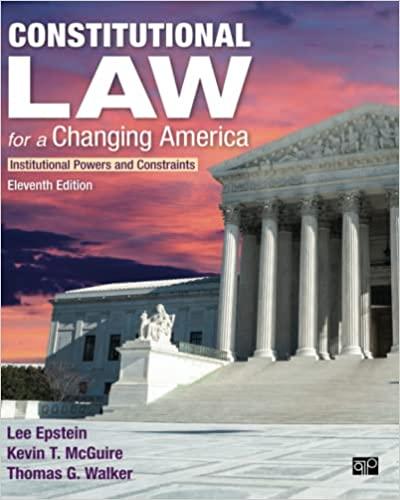Question
Question: If one of the six criteria that you outlined does not exist, is it that there is no warranty of merchantability or has there
Question:
If one of the six criteria that you outlined does not exist, is it that there is no warranty of merchantability or has there been a breach of the implied warranty of merchantability?
Background:
First, to fully understand what the implied warranty of merchantability is, it is imperative to know what merchantable goods are. Saylor (2012) defined merchantable goods as qualified by six characteristics, and these are:
- Pass with no objection under the contract description
- Goods are of fair and average quality under said description
- Are fit for the ordinary purpose under which they are being sold and used
- Function; under permitted variations; of even kind, quality, and quantity within each and among all units
- Contained, packaged, and labeled adequately per the agreement
- Meet the promises made on container label
Should a good meet these characteristics, the seller would be obligated under the implied warranty of merchantability to remedy the situation if there is discourse about a particular product that had been sold by the company. Under the implied warranty, the product must meet the standards of being "fit for the ordinary purpose", which means, the goods sold meet the description and ordinary purpose for which they are sold. For a good to meet the qualification of "fit for the ordinary purpose"-- a good must pass one of the two tests. These tests are the natural-foreign test and reasonable expectation test. According to Saylor (2012), the natural foreign test determines if the substance in the product is natural to the substance, while reasonable expectation test determines what the consumer's reasonable expectation is. Further, the implied warranty of merchantability ensures that the consumer is receiving the product that tehy were expecting a little or no variation based on how a product is labeled, packaged, and delivered.
Under the implied warranty of merchantability, Clean can't be sued by a client, unless otherwise they are selling the product to them. Clean is performing a service for the said client and if the cleaning is not up to the standards of the client or does not meet the promises as laid out in a written agreement or contract, then Clean may be sued but on different grounds. Clean can't be sued for using EPI's products to perform a service because the service does not meet the requirement for being a merchantable good, which is one of the major characteristic of implied warranty (Saylor, 2012). Clean would be more likely to win a case against EPI for not meeting the described standards or quality, than the client would for suing Clean on these grounds.
Step by Step Solution
There are 3 Steps involved in it
Step: 1

Get Instant Access to Expert-Tailored Solutions
See step-by-step solutions with expert insights and AI powered tools for academic success
Step: 2

Step: 3

Ace Your Homework with AI
Get the answers you need in no time with our AI-driven, step-by-step assistance
Get Started


